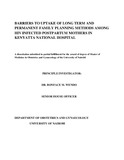| dc.contributor.author | Wendo, Bonface M | |
| dc.date.accessioned | 2014-07-01T09:09:35Z | |
| dc.date.available | 2014-07-01T09:09:35Z | |
| dc.date.issued | 2013 | |
| dc.identifier.citation | Degree Of Bachelor Of Medicine in Obstetrics and Gynaecology | en_US |
| dc.identifier.uri | http://hdl.handle.net/11295/71463 | |
| dc.description.abstract | Introduction
Family
planning is a key component of prevention of mother to child transmission of HIV and
reduction of maternal morbidity and mortality. While most health facilities in Kenya provide
long term and permanent
methods of
family planning,
the long term and permanent family
planning prevalence is still low and especially among
the HIV positive patients. Post-partum
visit at sixth week provides an opportunity to counsel and provide LTCM to the mothers. This
study was therefore conducted to assess both client and facility factors that contribute to missed
opportunities for LTCM
uptake
among HIV infected post-partum women at sixth week visit in
order to inform policy and design interventions that can improve uptake.
Objective of the study
The
objective
of the
study is
to determine factors that hinder uptake of LTCM by HIV infected
postpartum women
attending PNC at the KNH.
Methods
A facility based descriptive cross sectional study was conducted at the HIV postpartum clinic at
KNH using quantitative method of data collection from March 2013 to July 2013. An exit
questionnaire was used for interviews
after the mothers had been attended to by the clinician. A
total of 103
HIV infected postpartum mothers were interviewed. The mothers were interviewed
on family planning information, counseling during pregnancy, child birth, post natal period and
their socioeconomic and clinical characteristics.
Quantitative data was analyzed using SPSS version 17.0. Odd’s ratios, 95% confidence intervals
and p value set at 0.05 were used to determine statistical significance of the associations between
independent variable
s and preference for LTCM. Qualitative data was coded and analyzed using
content thematic analysis.
Results
The
postpartum
uptake of LTCM by HIV infected postpartum mothers attending postpartum
clinic at sixth week visit was only 0.97%.
However 41.7% of the mothers had preference for
long term contraceptive methods. Older age
(pvalue =0.05) and knowledge of the HIV status of
the spouse(pvalue= 0.002, OR 3.8
(1.6
-
8.9) were significantly associated with preference for
uptake of LTCM. Barriers to LTCM use included low rate of counseling amongst mothers
attending the postpartum clinic as only 7.8% of the mothers were counseled by the clinician
during the sixth postpartum visit. Other barriers included failure to provide LTCM services in the
same setting as the
postpartum clinic and 58.3% of
the mothers’
preference for barrier methods.
Conclusion
The low rate of family planning counseling by clinicians, patient preference for barrier methods
especially condoms, and lack of integration of FP services with HIV postpartum clinic services
at the HIV postpartum clinic lead to missed opportunities for long term and permanent family
planning methods uptake.
One on one clinician counseling with HIV infected postpartum
mothers on LTCM could enhance accurate information on
FP. This would reduce the perceptions
on LTCM hence improve their uptake.
Recommendations
There is need to integrate family planning services and maternity
services at KNH. Measures
should be put in place to use flip charts for patient education on long
term family planning
methods. Also, there is need to introduce a check list on what the patients are to be advised on in
the HIV postpartum clinic to minimize missed opportunities for LTCM use
by clinicians.
Nevertheless, health education to patients is required to
remove the
perception that when one is
using
barrier methods
especially condoms,
one does
not require a LTCM.
Finally, disclosure of
HIV status to the partner should be encouraged | |
| dc.language.iso | en | en_US |
| dc.publisher | University Of Nairobi | en_US |
| dc.title | Barriers to uptake of long term and permanent family planning methods among HIV infected postpartum mothers in Kenyatta national hospital | en_US |
| dc.type | Thesis | en_US |
| dc.description.department | a
Department of Psychiatry, University of Nairobi, ; bDepartment of Mental Health, School of Medicine,
Moi University, Eldoret, Kenya | |

